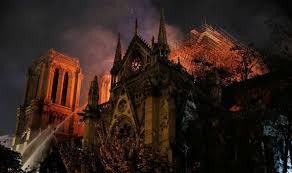
See from His head, His hands, His feet,
Sorrow and love flow mingled down!
Did e’er such love and sorrow meet,
Or thorns compose so rich a crown?
When I Survey the Wondrous Cross
By: Isaac Watts, 1674-1748
Listen as you read. This is a nice instrumental version.
As I write, the world is still abuzz about the tragic blaze at Notre Dame in Paris. Amidst the coverage I heard that an important relic had been saved, the Crown of Thorns of our Savior. I hate to admit, I did not even realize what is believed to be His crown was actually among the treasures at Notre Dame. It is of note that this encased and gilded crown was a topic of interest among all the great pieces on repository there.
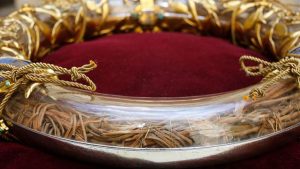
It makes sense though, since after all, this is the richest crown, that of greatest value, in all of history. Although the thorns have been removed and can be found at various places around the globe, this is purported to be the crown Christ wore when He offered His life to pay the penalty for our sins. That endows it with a value that simply can not be measured.
Rich, Beyond Measure
Undoubtedly, there have been countless times over the course of history when sorrow and love were mingled together in an expression of love and self sacrifice. But none comes close to Calvary.
What a beautiful turn of phrases between the second and third lines of this stanza. From sorrow and love to love and sorrow. It is way more than just a clever modified repeating of the same two words. It is a call for all who seethe beauty of the first, to embrace the extravagance of the last.
The other interesting thing to note is the linguistic device employed in the first two lines as contrasted with the second two lines. It begins with an emphatic declaration, and concludes with a rhetorical question, the latter making the stronger statement by virtue of having asked a question merely for effect, since no answer is even expected, or necessary. Just to be crystal clear, no thorns, or frankly any other material, ever composed a crown as rich as this one.
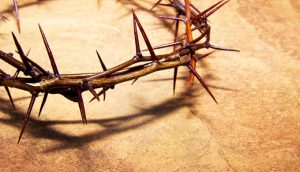
But How?
The first thing to consider is the apparent oxymoron, or contradiction of incongruous words. How can any crown made of thorns be valuable since the mere use of thorns in any crown implies a terrible pain for the wearer, which seems to be designed for the antithesis of the honor a crown is normally meant to convey? That is kind of the whole point though.
His executioners meant to humiliate Jesus since the claim of His kingship had been a crucial accusation about Jesus from the Jews before Pilate. So much so that Pilate had a sign posted above Christ on the cross which read, “The King of the Jews” to which the chief priests objected asking it to be changed to “This man said, I am the King of the Jews”. Pilate’s reply?
“What I have written I have written”. (John 19:17-22)
This is a fascinating series of events because Jesus never claimed to be a King, but He also never denied the claim. (John 18:33-40) The Jews had drummed this up to strengthen their case against Him, and make it a Roman matter punishable by death. After pressing Jesus on this point, Pilate seems to have posted this more to mock their claim than make the statement itself, having found no fault in Jesus and literally washing his hands of the whole matter.
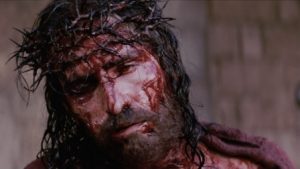
All the same, he condemned Jesus to die.
King of Kings
What was meant to mock Him, became a symbol of His extraordinary kingship, one marked by self-sacrifice, unlike most.
And what kind of King would allow this happen? One whose Kingdom was not of this world. Jesus clearly stated that in John 18, but then when pressed by Pilate regarding his authority to crucify Him Jesus offered possibly the most powerful response in this discourse.
Jesus answered him, “You would have no authority over me at all unless it had been given you from above. Therefore he who delivered me over to you has the greater sin.” John 19:11
A higher purpose was unfolding, one set in motion by the Highest Authority, God Almighty. One set in motion for the purpose of both declaring and making available the love of God, by paying the penalty sin required. In order to redeem us, that expression of love was mingled with great sorrow.
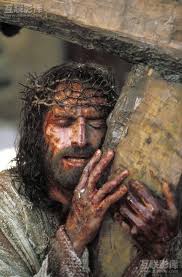
So what for us starts out as sorrow but causes great love, for God starts out as love and causes great sorrow. We see His sacrifice and share tears with those first disciples, then we are overwhelmed by a rush of love as we realize what He has accomplished. The Father commanded His sacrifice and the Son obeyed out of love, then both experienced an inexpressible sorrow as they were separated for a time by what Christ accomplished when He became sin for us.
Again to be crystal clear, at no other point in history did, or will, such love and sorrow meet.
Jesus, thank You for the remarkable expression of love and sorrow Your crucifixion was, and is. Across 2,000 years we still find our breath taken away when we rightly survey and truly see Your sacrifice on that cross. This Easter, help us to see these things deeply and clearly, and pour out the praise due Your name. In Jesus name. Amen.
Sober Thinking!
Are these thoughts helping you to develop greater spiritual awareness? Sign-up in the form to the right above to get updates of new tools to help you be Resonant.
Below is content available only to Subscribers and Free Members. Want to learn more about accessing all the additional material in the Subscriber Content Library, click here. Or check out some samples at our Free Member Content Library. We have lots of tools and lots of options designed to help you be Resonant! Check them out today!!
Subscribers AND Free Members enjoy this podcast! Everyone else, the transcript below.
Podcast 4.3 Transcript
Welcome to Thursday Thoughts at Resonant 7, where we reflect on the reality of God and resolve to let it resound in our lives, repeatedly. Let’s think about this.
See from His head, His hands, His feet,
Hebrews 12:2a ESV
Looking to Jesus, the founder and perfecter of our faith, who for the joy that was set before him endured the cross, despising the shame,
When you look at our Savior crucified on the cross, what do you see? Many look at the cross but fail to truly see the founder and perfecter of our faith. Jesus, thank You for seeing the joy on the other side of self-denial. Help me to do the same.
Sorrow and love flow mingled down!
John 3:16 ESV
“For God so loved the world, that he gave his only Son, that whoever believes in him should not perish but have eternal life.
God so loved the world that He gave. That’s what love is, giving. The fact that He gave His only Son is mind-boggling. The sorrow both Father and Son must have felt is unfathomable, but so is the love demonstrated. Thank You Father for allowing your love to mingle with sorrow, for our good.
Did e’er such love and sorrow meet,
Ephesians 5:2 ESV
And walk in love, as Christ loved us and gave himself up for us, a fragrant offering and sacrifice to God.
It was the love of Christ that led Him through the sorrow of giving Himself up for us, an offering and sacrifice to God. Jesus joined the Father’s sorrow with His own. Thank You Jesus for modeling other-centered love in the most profound way possible, the Anointed One becoming sin for us.
Or thorns compose so rich a crown?
John 19:5 ESV
So Jesus came out, wearing the crown of thorns and the purple robe. Pilate said to them, “Behold the man!”
I love rhetorical questions. Is there a more powerful linguistic tool? I think not. To be clear, no thorns ever composed a crown so rich as this one, for it became the one the God Man wore as He willingly laid down His life. Hallelujah!
Take a few moments to talk to Jesus about what has come to your mind, or just listen to what He is saying to you, then I will read our text once more.
See from His head, His hands, His feet,
Sorrow and love flow mingled down!
Did e’er such love and sorrow meet,
Or thorns compose so rich a crown?
Take the mindfulness of God’s presence cultivated in these last few minutes into the next ones and beyond. Until next time, be Resonant.
Leave a Reply